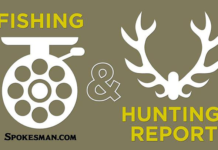Due to understaffing at the U.S. Forest Service and a cumbersome process, it can take several years and hundreds of work hours before Colorado guides receive a permit to take small groups fishing, hiking or do other recreational activities on federal lands.
To get around it, northern Colorado anglers drive customers 90 minutes into Wyoming because they can’t get a permit to fish in this state. In southern Colorado, the Forest Service has ignored permit applications, effectively prohibiting experts on dangerous 14ers like Blanca Peak and Little Bear Peak.
The result of this outdated regulatory system, according to frustrated outfitters and guides, is fewer trained experts in forests and limitations on Colorado’s famed outdoor recreation industry.
“Is hiking an environmentally impactful activity? No. Hell no,” said David Leinweber, owner and president of Angler’s Covey in Colorado Springs. “This is bureaucracy at the highest level.”
The problem came to the attention of Congress years ago and there is bipartisan agreement on how to solve it. But to date, a fix has not passed — and last week’s bill hearing saw Democrats and Republicans bickering over which of their names should be on the legislation.
“It is arguably absurd”
Let’s say you’re a trained hiker or backcountry skier or angler who wants to start a small business giving guided trips on federal lands. You would begin by reaching out to the agency overseeing those lands, such as the U.S. Forest Service or Bureau of Land Management.
And you would likely hit an immediate snag, according to Matt Wade, deputy director of the Boulder-based American Mountain Guides Association. That’s because permit issuance is often a secondary duty at federal land agencies, Wade said. Rangers do it after they’ve completed their primary work, such as trail management.
“You may hear that there isn’t an opportunity to apply because the agency doesn’t have the staff capacity to issue the permits,” said Wade, who owned a guide service for nearly a decade. You may be told to check back in two or three years.
If you’re fortunate enough to apply, you will spend as many as several hundred hours submitting a highly detailed plan — explaining where your trips will go, what equipment you’ll take, what your safety protocols and insurance policies are. You will pay a $115 application fee and, if approved, agree to turn over 3% of your revenue to a federal land agency.
“It is arguably absurd to place so many barriers in front of the opportunity for the public to go with the assistance of a professional,” Wade said, because guided tours are less likely to harm the environment. “To limit that is absolutely puzzling.”
John Ziegman owns North Park Anglers Fly Shop in the small Jackson County town of Walden, 30 miles from the Wyoming border. He would like to take customers fly fishing just outside of town but, after years of trying, his company can’t get a Forest Service permit. So, his employees drive to a different ranger station in Wyoming, where Forest Service employees are more lenient. The stations are in the same federal forest but have vastly different approaches.
“We can’t do anything right here, out our back door, but I can drive an hour and a half and go show these people a great time,” fly shop manager Scott Graham said.
In some places, agencies won’t issue permits because they haven’t conducted environmental assessments and don’t have the staff to conduct those assessments. The result is effectively a freeze on hiking tours in places such as Blanca Peak and Little Bear Peak, according to Wade, as well as on backcountry skiing at Berthoud Pass in Clear Creek County.
The Forest Service did not respond to a Denver Post email this week asking whether the agency is unable to issue recreational permits because it lacks the staff to do so.
These permitting problems exist nationwide. Guide groups from all of the Mountain West states have asked Congress to address the issue since 2019, as have companies in Alaska, California and West Virginia. Senators representing nearly every western state are cosponsoring the current bill to do so.
When permits are issued, they’re too narrow in scope, guides say. For example, the Mountaineers, a Seattle-based nonprofit guide group, teaches rock climbing in a national forest in Washington. But its permit does not allow it to teach the very similar skill of rock scrambling, the group’s conservation and advocacy director Betsy Robblee told a House subcommittee on public lands hearing on June 8.
“We spend an enormous amount of staff and volunteer time navigating the various permitting processes of land management agencies. These convoluted systems are equally as challenging for under-resourced land managers to administer,” Robblee said.
“I am deeply disappointed”
The latest attempt to fix this problem is called the Simplifying Outdoor Access for Recreation, or SOAR, Act. It was introduced two years ago by bipartisan groups in the U.S. House and Senate and reintroduced this month.
Rep. Joe Neguse, a Lafayette Democrat who is leading the House effort this year, was accused during the hearing of not reaching out to Republicans before reintroducing it. Arkansas GOP Rep. Bruce Westerman called SOAR “a great bill” that has bipartisan support. He accused Neguse of “petty partisanship” and trying to take credit for what has been a bipartisan effort.
The bill would greatly simplify the permitting process and give federal agencies more leeway to issue permits, guides say. It would require agencies to respond to permit requests within 60 days, ending what Wade calls the “black holes” that applications fall into for years. It also would allow guides traveling between lands controlled by multiple agencies to use one permit.
The Forest Service and BLM will support the bill if minor changes are made, officials for both land agencies told Congress.
A 2019 version of the SOAR Act was approved by the House Natural Resources Committee unanimously last year. Neguse anticipates this year’s version will be amended over the summer and sent to the full House. The Senate version, which is cosponsored by Democratic Sen. Michael Bennet of Colorado, is awaiting a hearing.
For Leinweber and his fishing guide company in Colorado Springs, the bill is an opportunity to knock down bureaucratic hurdles that, he says, needlessly hinder businesses like his.
“Look, gosh, we’re just going fishing,” he said with a laugh.
Credit: Source link






























